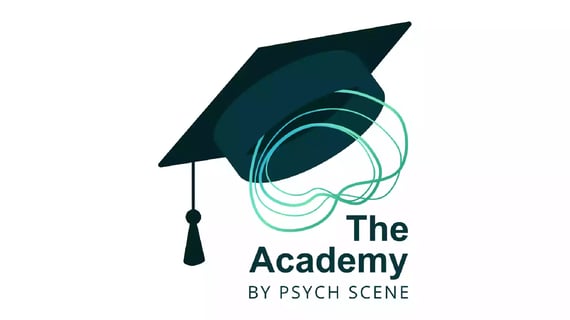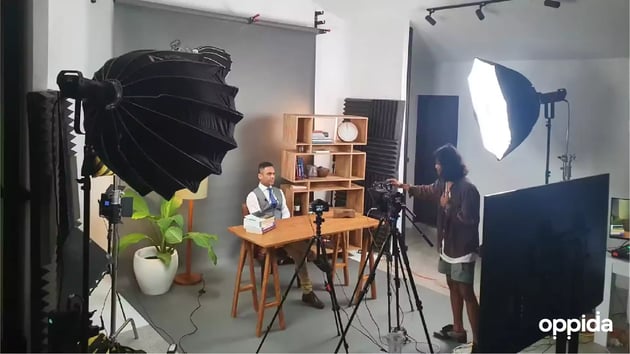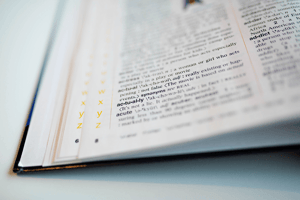Warren Kennard is a globally connected higher education professional and reformer with extensive...
Filming course media in Bali: a work deductible trip
How did this come about?
Fancy a fully work deductible trip filming course media in Bali? How is it even possible? Follow Sanil Rege's footsteps!

Late 2021 Oppida began working with Psych Scene – a successful Australian training provider in the specialised field of psychiatry. Founded by Dr Sanil and Jaana Rege in 2009, the company offers continuing professional development and exam preparation for consultant psychiatrists, trainees and mental health practitioners.
The existing Psych Scene Hub is an online platform for sharing ideas, cases and concepts – a living textbook intended to bridge the gap between academic studies and real world experiences.
With 15,000 general practitioners and psychiatry consultants on their mailing list and over 100,000 visitors to Psych Scene Hub every month, the company was already positioned as a trusted brand for professional development in psychiatry, but they were looking to take their offering to the next level. Following an initial engagement to provide strategic advice and direction, Psych Scene contracted Oppida to design, develop and publish 18 online courses as part of the launch of the Psych Scene Academy.

Oppida also worked with Psych Scene to develop the new Psych Academy brand, creating a beautiful UX for the new learning management system and advised on the best way to produce video content.
As the team were trying to figure out how to get it all filmed in Melbourne in a cost effective and efficient way, Bianca popped in a meeting and suggested to Sanil and Jaana that they bring the family to Bali for the week of rich media production in our Bali studio (the LightHouse), and they jumped at the idea.

At the end of the production week, Oppida CEO Bianca Raby sat down for a chat with Sanil about his experiences working with Oppida and LightHouse in Bali – watch it here.
Video Transcript
Bianca: Hi. Bianca Raby, CEO of Oppida, and I’m here with Sanil Rege, who is the academic lead for Psych Scene. We’ve just finished five full days of filming here at the LightHouse in Bali. So, Sanil, how are you feeling?
Sanil: Well, a bit tired, but really, really satisfied. Great experience and yeah, just getting into it for five days and just making sure that… It’s a satisfying feeling at the end of day here.
Bianca: Awesome. And we’ve been filming for your new product, which is Psychscene Academy. Can you talk us through a little bit about why you started Psychscene Academy?
Sanil: Yeah well, we sort of founded Psychscene in 2009, so we’ve been going at education for a while, training over 10,000 mental health professionals to date. And I had this passion of sort of summarising articles and reviews and interviewing people, making videos. So I sort of started a blog, a WordPress blog called Psychscene Hub. That’s grown in popularity because what we found is doing these articles, these videos, interviews, etc. – we’ve now got over 400 articles and videos… It’s grown in popularity, people really value the actual content on there. And what we thought is, that’s going to remain free. But people really needed a structured way of learning, but not just the online courses that we have. And this is really where, you know, I, of course, got in touch with Oppida because we wanted to work with a company that actually understood the design process because I think learning, online learning, is about designing something beautiful. And that’s how we thought about creating the academy by Psychscene, whereby the academy is sort of a platform and ecosystem where learning is efficient but also based on principles where the individual learns efficiently.”
Bianca: Awesome. And, yeah, that’s why we were so excited at Oppida, when you contacted us, because that is often overlooked, especially in the field that you work in. It’s a lot of information. It’s very heavy stuff. You guys deal with some very complex information and the assumption is that a PDF is enough. But often you’re talking to people who’ve had long days. They’re already kind of exhausted by the time they get to it and they need some help. And that is where the design comes in. So I know our team has been extremely grateful for you allowing them to kind of bring that to life with the course. And we’re very excited to be launching very soon. And we’re even more excited when you were keen to really try and up the game around your teaching videos. So, tell us a little bit about why you decided that video was going to be a really key part of the Psychscene Academy.”
Sanil: Well, I think videos are one of those aspects that encompasses… Even from a neuroscientific point of view, we’ve got a key part of the brain, which is an audio visual scratch pad, as they call it. And sure, we can read something. We’ve got essentially the visual part, but then we’ve got all these other senses, of course. The audio sense, the visual component of it and the feeling that we get when we listen to something. And video is powerful because one can actually engage with the individual whilst you’re showing them something. And when we’re talking about psychiatry, understanding of the brain, being able to point out the areas of the brain, mechanisms of action, or medication… I could stand and talk about it, but the individuals got to visualise it, and with visualisation comes the feeling as well. So, I think it’s a combination of all of that, and it makes video a really powerful tool. The second reason is, of course, people are consuming a lot more videos nowadays. So I think video is really the way to go because it fits in with how people learn effectively.
Bianca: Absolutely, I mean, we’re competing for attention 24/7 because everything on our phones is competing for our attention. And so video is a really great way to engage, especially when you’re not going to see those learners. So when you’re doing a self paced type of courses, which you are inside the academy, it’s a way to connect so that they feel trust in you, they feel comfortable that you are the person behind those words and that teaching. But I want to go back to your point about the visuals with the words, and you’ve just come out of shooting this morning with a lightboard. So tell us about what it was like to shoot with a lightboard.”
Sanil: Yeah, it was the first time and a great experience. And I remember the first time you ever mentioned it and I was like, yeah, that’s something that’s beautiful, it’s creative, it’s engaging, it’s different. And what I really liked about it was that, for the audience, it can really provide sort of a way of learning where they’re engaged so they actually see the individual, which is different from the whiteboard because you’re almost sort of part of the diagram as well and that’s what’s different as opposed to standing on the side for example, with a whiteboard. This one, you’re sort of immersed in that whole experience where I am part of everything that I’m showing.



